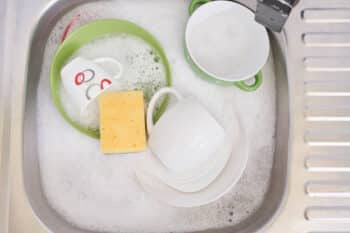ABOUT THE AUTHOR
Max Rose
Max Rose is the owner of Four Seasons Plumbing, a plumbing company in Asheville, North Carolina.
Uh-oh! The kitchen sink is clogged again! A slow draining kitchen sink is not only frustrating, but It can also often bring our daily lives to a halt as we try to figure out how to cook or just wash dishes with a backed-up sink full of gross, dirty water. In a desire to hurry up and fix the problem, you might be tempted to grab a drain cleaner to fight those nasty clogs.
But wait! Chemical cleaners are filled with harsh chemicals that can be awful for your drain. While they may fix the initial problem, the damage from chemical damage will likely be worse than a simple clog. There is also a risk of serious injury to the skin and eyes from splashing chemicals. Let’s try different methods first.
With grease and food build-up being the main culprits, there are thankfully quite a few home remedies you can try to eliminate the problem yourself. With a little DIY and even a few kitchen staples, you might be able to unclog that sink and get back to normal life.

Photo: Kitchen sink full of dirty dishes by Marco Verch under Creative Commons 2.0
Pouring boiling hot water down the drain is an inexpensive, age-old trick for tackling clogged drains. By loosening up hardened grease, boiling water can help flush the clog down and fix a slow-running drain.
When poured down the drain, grease and grease-laden foods cool inside and start forming a coating that can build up over time. If grease buildup is the underlying problem, pouring a pot or kettle of hot water into the sink a couple of times and checking to see if the sink is finally draining should solve the issue.
If plain water didn’t work, try using common household items that might be in your kitchen pantry. Combinations of salt and water, baking soda and vinegar, and other variations are common natural solutions for clogged drains.
For example, the volcano technique involves pouring equal amounts of baking soda and vinegar down the drain. There should be a chemical reaction resulting in bubbles. Add a stopper to seal the sink during this reaction and wait a few minutes. Combined with repeated sessions and followed with boiling water, this method might help clear simple blockages.
Just like we would reach for the plunger when dealing with clogged toilets, plunging is a good technique when less intensive methods fail.
Start by removing excess water until there is only an inch or so of water left in the sink. Place a plunger over the opening and plunge vigorously until the water starts draining.
The P-trap is a curved portion of pipe under your sink that can often get clogged with larger food particles. If previous methods haven’t worked, you may need to grab a pair of pliers and a bucket.
With a bucket on hand to catch backed-up water, carefully remove the P-trap and dig out any debris you find. Replace the P-trap and tighten the connections before running water and verifying the sink is draining properly.
If the blockages are further inside the plumbing, plungers and boiling water isn’t going to work. Instead, try sending a snake (also called an auger) down the drain to fish out any stubborn blockages.
Regardless of the cause, slow or clogged drains are an annoying problem to fix. Sometimes, DIY methods just won’t work, and it is time to get some help.
The best way of tackling slow drains is to get professional help. At Four Seasons, our licensed and experienced plumbers are equipped to handle a variety of plumbing repairs in Asheville, NC. Need emergency plumbing services in Asheville, NC? Give us a call!
ABOUT THE AUTHOR
Max Rose is the owner of Four Seasons Plumbing, a plumbing company in Asheville, North Carolina.